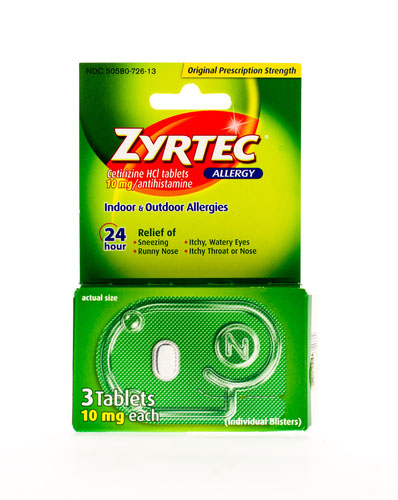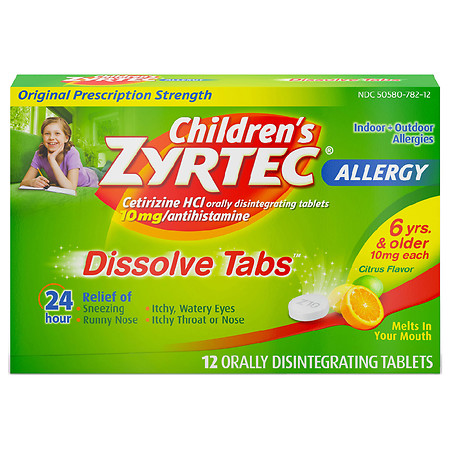Can Dogs Eat Zyrtec? Is Zyrtec Safe For Dogs?
 |
| Can Dogs Eat Zyrtec? Is Zyrtec Safe For Dogs? |
Can Dogs Eat Zyrtec?
Allergies are unpleasant for all species. If you mistakenly think that allergies are specific to humans, your dog is probably without allergies. But if you've noticed that your dog is itchy, has a tendency to lick or chew on his feet, or burst into hives, then chances are he has allergies. Fortunately, there are allergy medications that are safe for your dog. Zyrtec is readily available and safe for your dog.
Can Dogs Take Zyrtec?
Yes, Zyrtec is considered a safe medication for your dog. Zyrtec (cetirizine) is an antihistamine that is safely tolerated in dogs and used to treat allergic skin conditions. Although there have not been many veterinary studies on its effect on dogs, there is no evidence that it is dangerous for dogs. It should, however, be avoided in dogs with liver disease, to avoid taxing the already weakened or damaged organ.
The Zyrtec formulation recommended for dogs
Zyrtec D is actually very harmful to all breeds of dogs. Any Zyrtec formula containing a “decongestant” (the D in Zyrtec-D) is dangerous and unsuitable for dogs. The formula recommended by most veterinarians is linked below, at the 10 mg dose. Be sure to read to see the proper dosage for your dog's weight!
Allergies In Dogs
Before you start using Zyrtec in dogs, let's first talk about allergic responses, why they happen, and how drugs like Zyrtec work to stop them. When an allergen crosses your dog's path, either in food or in the environment, special cells in your dog's skin, called mast cells, release large amounts of histamine and other inflammatory chemicals. Histamine in particular triggers an inflammatory reaction that manifests itself in redness, heat, swelling, and itching. This inflammatory reaction can occur whenever your dog comes in contact with the allergen. This means that if it is in its normal food or a plant in your garden, you consider never itching or scratching.
The best treatment for allergies is to find the offending allergen and remove it from your dog's food or environment; Easier said than done. The next best treatment is to prevent the inflammatory reaction by blocking the actions of histamine. A final treatment would be anti-inflammatory drugs to decrease the severity of the reaction. Anti-inflammatory drugs do nothing to prevent the allergic reaction, they just help treat it once it has already happened.
What is Zyrtec?
 |
| Can Dogs Eat Zyrtec? Is Zyrtec Safe For Dogs? |
Zyrtec, or cetirizine, is an antihistamine. It basically works by blocking histamine so that it cannot induce an inflammatory response as deep in your dog's skin. As you may know, when using other antihistamines on your dog, some can cause drowsiness and even mild sedation as a side effect. Zyrtec is a slightly different class of antihistamines than these, so it doesn't tend to produce the drowsiness you think of.
Zyrtec can be used to treat long-term allergic reactions in your dog caused by seasonal allergies and food allergies. It can also be used in the short term to treat insect stings or stings and the reactions of poison ivy or poison oak.
What Are The Side Effects Of Zyrtec?
Fortunately, Zyrtec is fairly well tolerated by dogs. The most commonly reported side effects are vomiting or excessive salivation after taking the pill. This can be avoided or decreased by administering the dose with a small amount of food or with a meal.
Drowsiness has been noted in small dogs when receiving higher doses. It is always best to give the lowest dose first and increase the highest doses if necessary to avoid these side effects.
Zyrtec should not be used in dogs who are also taking other central nervous system depressants such as diazepam or alprazolam. The combination of the two drugs could cause heavy sedation.
Which Dogs Can Use Zyrtec Safely?
 |
| Can Dogs Eat Zyrtec? Is Zyrtec Safe For Dogs? |
Since Zyrtec is well tolerated in dogs, really any itchy dog can benefit from its use. The precaution should be used in older dogs or those suffering from liver or kidney disease as they do not remove the drug from their system as effectively. It may be best to try alternative treatments for these dogs before reaching Zyrtec.
Zyrtec is safe to use in pregnant dogs. Even large amounts of the drug cetirizine have not shown any harmful effects on the development of the fetus. However, a small percentage of it is excreted in milk, so it is best not to use Zyrtec in lactating bitches.
What About Zyrtec-D?
There is another Zyrtec product on the market that includes pseudoephedrine, a decongestant popular in cold medicine. This product, Zyrtec-D, is not safe to use in dogs. Dogs agree with the drug cetirizine, but pseudoephedrine is extremely toxic. Always make sure you get Zyrtec and not Zyrtec-D when purchasing this allergy medication.
How Much Zyrtec Can I Give My Dog?
It is very difficult to overdose a dog with an antihistamine, which partly explains why it is so safe. However, this does not mean that you should not administer the drug with caution when dosing your dog. There are different recommended doses depending on what you are treating. Itchy skin will require a different dose of antihistamine than an allergic reaction to a bee sting, for example.
Atopic dermatitis is a chronic inflammatory skin disease associated with allergies. It is most often triggered by environmental allergens such as pollen and mites. You will give your dog 5-10 mg once a day. The amount will depend on the size of your dog and the severity of his dermatitis. You should consult your veterinarian before freely dosing your dog with an amount that you think is safe.
Allergic dermatitis has allergic reactions to things like fleas. It generally occurs during exposure to an allergen and disappears when this allergen is eliminated. You can give 2.27 mg/lb every 24 hours and no more often. Your veterinarian may think that a higher or lower dose is more appropriate for your dog's specific case, so you should have a conversation with him about what will work best for your dog. Some veterinarians will recommend a more frequent dosage of 2.27 mg/lb every 12 hours, but again, it depends on the severity of your dog's case.
Typical Zyrtec dog dosages:
0-15 lb: 5 mg once daily
16-39 lbs: 10 mg once daily
40 lb +: 10 mg twice daily
Doses may need to be higher if your dog's allergies are severe. However, older dogs may not do well with a higher dose, so your veterinarian may recommend additional medications instead of a larger or more frequent dose.
Be careful with the formula you buy
Manufacturers of medicines for human use sometimes add additional medicines to their medicines to reduce the number of tablets that you, as a human, have to take. Zyrtec has a decongestant formula, so make sure you don't buy anything like Zyrtec-D. Your Zyrtec should only be made of cetirizine with no additional medicine or alcohol.
Are There Any Potential Side Effects of Zyrtec in Dogs?
 |
| Can Dogs Eat Zyrtec? Is Zyrtec Safe For Dogs? |
Side effects in dogs are not typical, and although they are relatively minor, you should stop giving them to your dog. Some dogs suffer from hyperactivity, but this usually happens when your dog has had too much Zyrtec. The most common side effects are vomiting and excessive salivation. Although rare, some dogs become considerably sedated.
Overdose is unlikely. During the tests, the animals received up to 220 times the recommended human dose and experienced no long-term effects. If your dog decides to eat his box of Zyrtec in one sitting, you should always call your veterinarian immediately for advice.
What Can You Give Dogs For Allergies?
Diphenhydramine (common brands include Benadryl and Dramamine) is the safest and most effective antihistamine for the treatment of allergies and has minimal side effects for dogs. Sedation is the most common, and some veterinarians prescribe Benadryl for dogs who need to relax on a long flight or experience nausea when traveling by car.
If your dog has severe allergies, you should consider having him tested to find out exactly what he is allergic to. Some dogs are allergic to any ingredient in their food (chicken or corn, for example) while others may need a steroid in their allergy regimen to feel total relief.
Allergies are not something you should not allow your dog to treat, especially if he has dermatitis. Raw, irritated and inflamed skin can become painful and prone to sores and infections without treatment. Sometimes all your dog needs is a daily dose of antihistamine to live a life without allergies, so treatment is both easy and inexpensive.
Is Claritin Or Zyrtec Better For Allergic Dogs?
 |
| Can Dogs Eat Zyrtec? Is Zyrtec Safe For Dogs? |
Dogs with rhinitis-like allergy symptoms (ie, clear discharge from the eyes, sneezing, runny nose) may very well benefit from antihistamines - although it is important to note that antihistamines do not generally do not help the itching related to allergies. Some dogs with symptoms of rhinitis may see minor to moderate relief with a daily antihistamine.
Zyrtec and Claritin are usually the first choice of veterinarians because Benadryl tends to not be as effective in treating these symptoms. There is no difference between Claritin or Zyrtec in terms of what works best since it really depends on a dog.
Veterinary dermatologists specializing in allergies recommend trying one for 2 weeks and if you don't notice symptom relief during this time, try the other.
Although Claritin and Zyrtec are not as likely to cause drowsiness like Benadryl, it is recommended that the medication be given at bedtime. However, in the case of excessive drowsiness, you should inform your veterinarian.
Advice About Can Dogs Eat Zyrtec
Yes, but…
Zyrtec is an antihistamine that veterinarians use to treat mild to moderate itching associated with seasonal and/or environmental allergies. It is a human drug that is used off label with relative success and safety in animals. Zyrtec can be used as needed for short-term allergic flares or long-term for chronic allergies, although long-term use is at the discretion of a licensed veterinarian.
Side effects that have been reported include excessive drooling, vomiting, and drowsiness.
Itching and inflammation can be caused by many things, including allergies, food hypersensitivity, parasites, bacterial and fungal infections. Although antihistamines can help manage allergies, they do not replace a thorough assessment by your veterinarian, as your pet may need additional or alternative treatment.
Also, not all antihistamines work the same for all animals. Just as one person may find that Zyrtec works better, another person may use Claritin, and so do pets. Don't be frustrated if Zyrtec doesn't seem to work for your dog. Have a conversation with your veterinarian about possible alternatives.
Provided you follow the dosing guidelines and use it as directed, Zyrtec is safe enough for your dog. Never use Zyrtec for an extended period without first consulting your veterinarian. Stop use if symptoms worsen or if you notice side effects.
A good rule of thumb for all medications and concerns regarding your pets is: if in doubt, ask the experts! You are the lawyer for your pet - get involved, stay informed!

Sports betting, casino games, stay dealers, TonyBet has it all. Over 카지노사이트 5,000 games offer you a wide variety|all kinds} of choices and a great choice of desk games. At TonyBet, you don't have|you do not have} to be a high-roller to enjoy high-quality games as a result of|as a result of} desk limits fit many budgets.
ReplyDelete